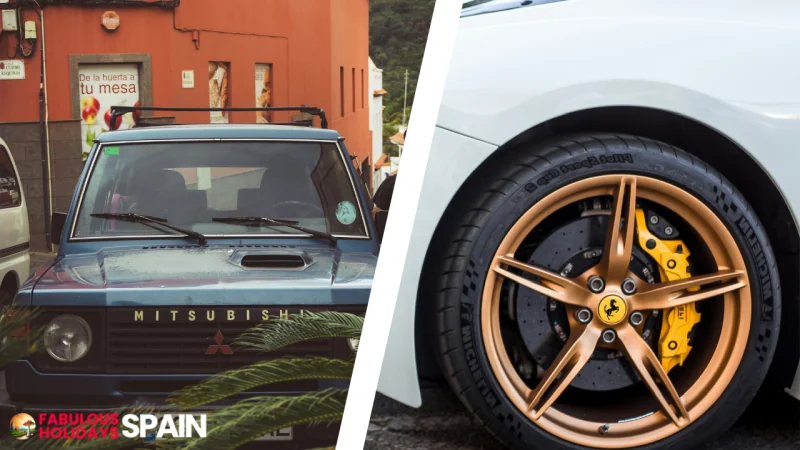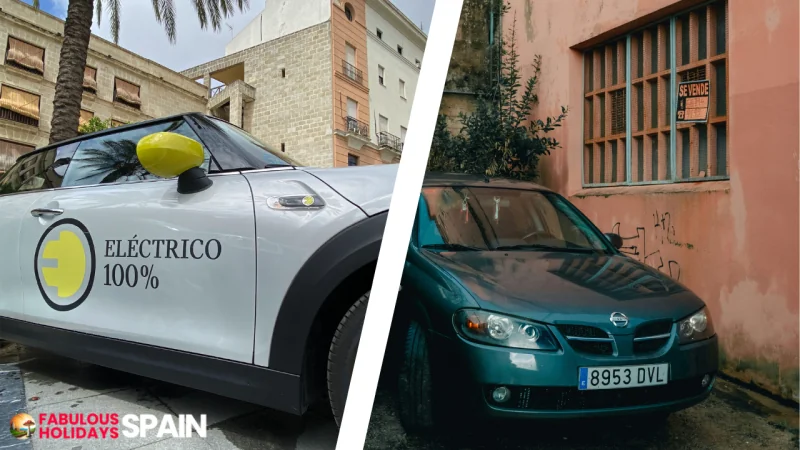Car Prices in Spain: Cost for New and Second-Hand Vehicles
According to the Spanish National Institute of Statistics (INE), the average price of a new car in Spain in 2022 was €20,802. This slightly decreased from the average price of €21,304 in 2021.
The average price of a used car in Spain in 2022 was €11,322, slightly decreasing from the € 11,622 average price in 2021.
Table of Contents
How Much Are New Car Prices in Spain?
The average price of a new car in Spain can vary depending on the type of car, brand, model year, and other factors.
Here are some examples of the average price of new cars in Spain by type:
- Sedan: €18,000 – €25,000
- SUV: €22,000 – €40,000
- Minivan: €25,000 – €35,000
- Luxury car: €40,000 – €100,000+

The Spanish National Institute of Statistics (INE) website provides a more complete list of average new car prices in Spain.
Here are some additional factors that can affect the price of a new car in Spain:
- Taxes: The Spanish government charges various taxes on new cars, including VAT, registration tax, and environmental tax. These taxes can add thousands of euros to the price of a new car.
- Import costs: If you buy a new car not made in Spain, you must also pay import costs, such as customs duty and transport fees. These costs can add thousands of euros to the car’s price.
- Dealership markup: Car dealerships in Spain can set their markup on new cars. This means that the price for a new car can vary depending on the dealership you choose.
How Much Are Second-Hand Car Prices in Spain?
The average second-hand car price in Spain in 2023 is €10,220. This slightly increased from the average price of €9,922 in 2022. However, the price of second-hand cars can vary depending on the type of car, brand, model year, mileage, condition, and location.
Here is a table of the average prices of second-hand cars in Spain by type of car:
| Type of car | Average price |
| Sedan | €8,635 |
| SUV | €11,235 |
| Van | €6,455 |
| MPV | €9,220 |
| Coupe | €10,750 |
| Cabriolet | €13,875 |
| Pickup | €12,625 |
Here is a table of the average prices of second-hand cars in Spain by brand:
| Brand | Average price |
| Seat | €9,125 |
| Peugeot | €10,750 |
| Renault | €10,525 |
| Nissan | €9,925 |
| Toyota | €11,325 |
| Hyundai | €9,325 |
| Volkswagen | €11,625 |
| BMW | €13,750 |
| Mercedes-Benz | €16,875 |
Here is a table of the average prices of second-hand cars in Spain by model year:
| Model year | Average price |
| 2023 | €8,550 |
| 2022 | €9,922 |
| 2021 | €11,225 |
| 2020 | €12,525 |
| 2019 | €13,825 |
| 2018 | €15,125 |
| 2017 | €16,425 |
| 2016 | €17,725 |
| 2015 | €19,025 |
Here is a table of the average prices of second-hand cars in Spain by mileage:
| Mileage | Average price |
| Less than 10,000 km | €10,922 |
| 10,000 km – 50,000 km | €9,750 |
| 50,000 km – 100,000 km | €8,550 |
| More than 100,000 km | €7,375 |
Here is a table of the average prices of second-hand cars in Spain by condition:
| Condition | Average price |
| Excellent | €12,375 |
| Very good | €11,525 |
| Good | €10,625 |
| Fair | €9,750 |
| Poor | €8,875 |
What are the Car Advertising Sites for Sale in Spain?
Here are some of the most popular car advertising sites for sale in Spain:
- Wallapop (https://es.wallapop.com/
- MilAnuncios (https://www.milanuncios.com/)
- Segunda Mano (https://www.milanuncios.com/coches-de-segunda-mano/)
- OCasiónPlus (https://www.ocasionplus.com/)
- Autoscout24 (https://www.autoscout24.com/)
- Motorpasión (https://www.motorpasion.com/)
- Autocasion (https://www.autocasion.com/)
- Coches.net (https://www.coches.net/)
Each of these sites has its strengths and weaknesses, so it is important to compare them before you decide which one to use.
Here is a table that summarizes the key features of each site:
| Site | Used cars | New cars |
| Wallapop | Yes | No |
| MilAnuncios | Yes | Yes |
| Segunda Mano | Yes | Yes |
| OcasionPlus | Yes | Yes |
| Autoscout24 | Yes | Yes |
| Motorpasión | Yes | No |
| Autocasion | Yes | Yes |
| Coches.net | Yes | Yes |
What is the best-selling model and brand in Spain?
According to the Spanish Association of Automobile Manufacturers (ANFAC), the best-selling car brand in Spain in 2022 was Seat, with sales of 90,561 units. This represented a market share of 13.5%. The best-selling car model in Spain in 2022 was the Seat Arona, with sales of 29,758 units. This represented a market share of 4.2%.
Here are the top 5 best-selling car brands and models in Spain in 2022:
| Rank | Car Brand | Sales (Units) | Market Share (%) |
| 1 | Seat | 90,561 | 13.5% |
| 2 | Toyota | 73,341 | 10.8% |
| 3 | Peugeot | 69,513 | 10.3% |
| 4 | Volkswagen | 63,851 | 9.6% |
| 5 | Renault | 62,625 | 9.4% |
Here are the top 10 best-selling car models in Spain in 2022:
| Rank | Car Model | Sales (Units) | Market Share (%) |
| 1 | Seat Arona | 29,758 | 4.2% |
| 2 | Seat Ibiza | 28,977 | 4.1% |
| 3 | Peugeot 2008 | 28,105 | 4.0% |
| 4 | Dacia Sandero | 25,997 | 3.7% |
| 5 | Volkswagen T-Roc | 23,633 | 3.4% |
| 6 | Kia Sportage | 21,515 | 3.1% |
| 7 | Seat Leon | 20,860 | 3.0% |
| 8 | Renault Clio | 20,182 | 2.9% |
| 9 | Volkswagen Golf | 19,553 | 2.8% |
| 10 | Dacia Duster | 19,522 | 2.8% |
What Are the Other Costs of Driving in Spain?
Here’s a list of other costs related to driving in Spain:
Mandatory annual expenses:
- Compulsory motor vehicle insurance (Seguro Obligatorio de Automóviles, SOA): This insurance covers third-party liability in case of an accident. The minimum mandatory coverage is €12,000 in compensation for any injuries or death caused to third parties. It is mandatory for all vehicles registered in Spain.
- Circulation tax (Impuesto sobre Vehículos de Tracción Mecánica, I.V.T.M.): This tax is levied annually based on the vehicle’s engine size and emissions. The rates vary depending on the Autonomous Community in which the vehicle is registered. The average cost of I.V.T.M. is around €200 per year.
- Vehicle registration tax (Impuesto de Circulación) is levied annually based on the vehicle’s age and emissions. The rates vary depending on the Autonomous Community in which the vehicle is registered. The average cost of vehicle registration tax is around €150 per year.
Variable expenses:
- Fuel: The fuel cost in Spain is significantly higher than in many other European countries. The average price of gasoline is around €1.80 per litre, and the average price of diesel is around €1.50 per litre.
- Parking: Parking can be expensive in Spain, especially in urban areas. The cost of parking varies depending on the location and time of day. Metered parking is typically charged by the hour, with rates ranging from €0.50 to €3.00 per hour.
- Maintenance: The cost of maintaining a car in Spain can be high. The average cost of car maintenance is around €1,000 per year, but this can vary depending on the type of car and the frequency of repairs.
- Repairs: The cost can be substantial if you have an accident or your car needs repairs. The average cost of car repairs in Spain is around €2,000.
- Servicing: It is important to get your car serviced regularly to ensure that it is in good working order. The average car servicing cost in Spain is around €500 per year.
Other additional expenses:
- Tolls: Many major highways in Spain have toll roads. The cost of tolls varies depending on the length of the journey.
- Vehicle inspections: Your car must be inspected annually to meet safety standards. The cost of a vehicle inspection in Spain is around €60.
- Replacement parts: The cost of replacement parts for a car in Spain can be high, especially for high-end brands.
- Traffic fines: If you are caught speeding, parking illegally, or committing other traffic offences, you will be fined. Traffic fines in Spain can be very high, with fines for speeding starting at €100 and rising to €600 for more serious offences.
Gasoline Prices in Spain
These prices have steadily increased in recent months due to different factors, including the war in Ukraine, which has caused oil prices to rise.
The Spanish government has tried to mitigate the impact of these rising prices, such as providing subsidies to consumers and implementing a temporary reduction in the tax on gasoline and diesel.
According to the official statistics from the Instituto Nacional de Estadística (INE):
- The average price of gasoline (95 octanes): €1.903 per litre (as of January 24, 2024)
- Average price of diesel: €1.866 per liter (as of January 24, 2024)

Diesel Prices in Spain
As of today, January 29, 2024, the average price of diesel in Spain is €1.56 per litre. This represents a decrease of €0.02 from the previous week.
Insurance and Vehicle Tax Expenses in Spain
here are the insurance and vehicle tax expenses in Spain:
Car Insurance
Car insurance in Spain is mandatory for all vehicles registered in the country. The type of insurance you need will depend on your vehicle type and the amount of coverage you want. The most basic type of insurance, known as terceros, covers third-party liability in case of an accident.
This means that the insurance will pay for the damage to the other vehicle if you are at fault. You can also opt for more comprehensive coverage, which will also cover your vehicle in case of an accident.
The cost of car insurance in Spain varies depending on many factors, including the type of vehicle, your age and driving record, and the amount of coverage you want. You can compare quotes from different insurers to get the best deal.
Mandatory Civil Liability Insurance (Seguro Obligatorio de Responsabilidad Civil): A mandatory insurance policy that covers third-party damages caused by the insured vehicle. Average annual cost: €250-€600
Comprehensive Insurance (Seguro a Todo Riesgo): Optional insurance policy that covers a wider range of damages, including theft, fire, and vandalism. Average annual cost: €700-€1,500
Vehicle Tax (Impuesto sobre Vehículos de Tracción Mecánica)
All vehicles registered in Spain are subject to an annual Vehicle Tax based on their engine size and age. The tax rates vary depending on the autonomous community (region) in Spain. For example, the average Vehicle Tax for a car with a 1.6L engine in Madrid is €146, while in Barcelona, it is €138.
Car Maintenance Prices in Spain
The cost of car maintenance in Spain can vary depending on the type of car, the garage you choose, and the specific repairs needed.
Here is a general overview of the average costs for common maintenance tasks in 2023:
- Oil Change: €70-€100
- Spark Plug Replacement: €40-€60 per spark plug
- Brake Pad Replacement: €100-€200 per axle
- Tire Rotation: €30-€50
- Air Filter Replacement: €20-€30
- Cabin Filter Replacement: €20-€30
- Belt Replacement: €100-€150
- Water Pump Replacement: €200-€300
- Timing Belt Replacement: €400-€600 (for more complex engines)
- Exhaust Repair: €100-€200 (depending on the extent of the damage)
- Suspension Repair: €200-€400 (depending on the specific components that need to be replaced)
- Transmission Repair: €1,000-€2,000 or more (depending on the severity of the problem)
- Bodywork Repair: €200-€1,000 or more (depending on the extent of the damage)
- Paintwork Repair: €100-€500 per panel (depending on the type of paint and the complexity of the job)
Highway Prices in Spain
The cost of using Spain’s toll roads, known as autopistas and autovías, varies depending on the length of the journey, the type of vehicle, and the time of day.
Toll rates
Toll rates are generally based on the length of the journey. The longer the journey, the higher the toll cost. However, some variable tolls vary depending on the time of day and the type of vehicle.
For example, the toll for driving from Madrid to Barcelona on the AP-2 motorway is €79.60 for a car during the day. However, the toll is reduced to €27.50 for a car during nighttime hours (between 10 pm and 7 am).
Vehicle classes
There are three vehicle classes for toll purposes:
- Class 1: Cars, motorcycles, and vans up to 2.0 meters tall.
- Class 2: Cars with trailers or caravans, buses, and minibuses with a maximum capacity of 17 seats.
- Class 3: Trucks, buses, and minibuses with a maximum capacity of more than 17 seats.
Time of day
The cost of using Spain’s toll roads is also based on the time of day. The highest tolls are charged during peak hours (usually 7 a.m. to 9 a.m. and 4 p.m. to 7 p.m.). Lower tolls are charged during off-peak hours and at night.
Prepaid toll tags
Spain has a system of prepaid toll tags called Telepase. Telepass drivers can save money on tolls, as they are not charged the extra premium for peak hours. Telepase tags can be purchased from many service stations and toll booths.
Free motorways
Spain also has a network of free motorways known as autovías gratuitas. These motorways are generally less busy than the toll motorways but may also be in worse condition.
How Important is the Automotive Industry in the Spanish Economy?
The automotive industry is a major player in the Spanish economy, contributing significantly to both GDP and employment.
According to the Spanish Automotive Industry Association (Anfac), the sector accounted for 13.3% of the country’s total exports in 2021 and generated €110.5 billion in value added.
The automotive industry also employs over a million people directly and indirectly, making it one of the largest employers in Spain.

Here are some of the key reasons why the automotive industry is so important to the Spanish economy:
- Exports: The automotive industry is Spain’s leading exporter, accounting for over 10% of total exports. This means that the sector plays a crucial role in driving the country’s economy and maintaining a positive trade balance.
- Value added: The automotive industry contributes significantly to Spain’s GDP. In 2021, the sector generated €110.5 billion in value-added, which is equivalent to 7.5% of Spain’s GDP. This means that the automotive industry is a major source of economic growth and wealth creation.
- Employment: The automotive industry employs over a million people directly and indirectly in Spain. This makes it one of the largest employers in the country, and it provides employment opportunities for people of all skill levels and educational backgrounds.
- Investment: The automotive industry is a major recipient of investment in Spain. In 2021, the sector attracted €13.3 billion in investment, which is a sign of confidence in the industry’s prospects. This investment is helping to support the industry’s competitiveness and its ability to develop new technologies and products.
Where Are Automotive Sector Job Postings Posted in Spain?
Here are some of the most popular websites for finding automotive sector job postings in Spain:
Infojobs InfoJobs is a Spanish job board website with a wide variety of job postings in the automotive sector. You can search for jobs by keyword, location, or company. You can also create a profile and save your searches to get notified when new jobs are posted.
Motorpasión Futuro Motorpasión Futuro is a Spanish website focusing on automotive news and technology. It also has a section with job postings in the automotive sector. The jobs are often more specialized than the ones on InfoJobs, but they are also more likely to be in new and cutting-edge areas of the industry.
LinkedIn LinkedIn is a professional networking website and a great place to find job postings in the automotive sector. You can search for jobs by keyword, location, or company. You can also connect with people in the industry and see what jobs they are working on.
Tecnoempleo Tecnoempleo is a Spanish job board website focusing on technical and engineering jobs. It has a good selection of automotive sector jobs.
Which Car Brands Originate in Spain?
Spain has a long history of producing cars, and many popular car brands originated in the country. Here are some of the most well-known Spanish car brands:
- SEAT: Founded in 1950, SEAT is a Spanish automaker headquartered in Martorell, Barcelona. It is currently a subsidiary of the Volkswagen Group.
- Pegaso: Founded in 1946, Pegaso was a Spanish truck and bus manufacturer. It was acquired by Iveco in 1990 and ceased production in 1994.
- Hispano-Suiza: Founded in 1904, Hispano-Suiza was a Spanish luxury car manufacturer. It produced some of the most exclusive cars in the world until its closure in 1944.
- ENASA: Founded in 1946, ENASA was a Spanish truck and bus manufacturer. It was responsible for producing the iconic Pegaso Z-201 truck.
Can Foreigners Buy a Car in Spain?
Yes, foreigners can buy a car in Spain. No restrictions exist on who can purchase a car in Spain, regardless of nationality. However, foreigners must meet some specific requirements to register a car in Spain.
Proof of residency
Foreigners must have proof of residency in Spain to register a car. This can be a rental contract, a utility bill, or a lease agreement.
Tax identification number (NIF)
Foreigners must also have a tax identification number (NIF) to register a car. The Spanish tax authority, Agencia Tributaria, can provide this.
International driving permit
Foreigners not from the European Economic Area (EEA) or Switzerland must have an international driving permit to drive a car in Spain.
Vehicle registration process
Once a foreigner has met all of the requirements, they can register a car in Spain by following these steps:
- Visit the Spanish traffic authority, the Dirección General de Tráfico (DGT).
- Bring the following documents with you:
- A valid passport or identity card
- Proof of residency
- Tax identification number (NIF)
- International driving permit (if applicable)
- Vehicle registration document
- Certificate of origin
- Fill out the registration form.
- Pay the registration fee.
- Receive your new registration document.
Foreigners can legally drive their cars in Spain with a valid registration document. They are also required to carry the registration document with them at all times while driving.
Here are some additional tips for foreigners buying a car in Spain:
- Shop around for the best price. There are many different dealerships in Spain, so it is important to compare prices before deciding.
- Beware of scams. Some unscrupulous individuals may try to take advantage of foreigners unfamiliar with the car-buying process in Spain. It is important to do your research and only deal with reputable dealerships.
- Make sure the car is in good condition. Have a mechanic inspect the car before you buy it.
- Negotiate the price. The sticker price is not always the final price. Be prepared to negotiate with the seller.
- Get the car insured. It is illegal to drive a car in Spain without insurance.
By following these tips, foreigners can confidently avoid any problems and buy a car in Spain.






One Comment